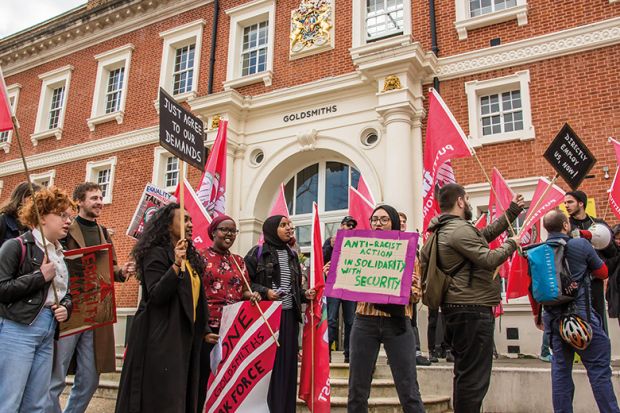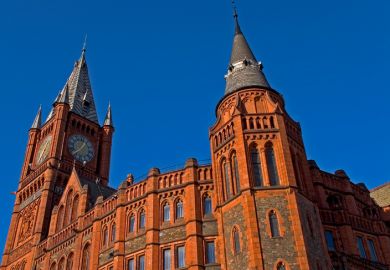Earlier this year, members of the UK’s National Union of Students voted through reforms to put its London headquarters up for sale, halve its permanent staff by cutting 54 jobs, and slash the number of sabbatical officers from 19 to seven.
The downsizing was a result of the revelations last year that the union was unable to meet a projected £3 million deficit. An audit by KPMG found that the organisation was simply too complex – comprising eight different companies – and advised a re-evaluation of its priorities.
The need for reform seems inescapable, but it comes after a period in which student movements have started up in earnest – be they demonstrations against tuition fees, rent strikes or campaigns for fossil fuel divestment.
The next few months promise Brexit and the potential for another general election – when students will be clamouring to make their political views heard. So how will the cuts to the NUS affect the power of the student voice?
The NUS’ biggest recent flashpoint was in 2010, when it mobilised tens of thousands of students to protest against the tripling of tuition fees in England. Michael Chessum, who was a sabbatical officer at UCL at the time, told Times Higher Education that he believed the scale and reach of the NUS was the only reason so many students joined the demonstrations.
Mr Chessum, now an anti-Brexit campaigner, said he feared that the cuts would make it harder for students to organise on key political issues. He said that he co-founded the National Conference Against Fees and Cuts (now known as the Student Left Network) with “one foot in the NUS and one foot outside”, utilising the union’s influence and resources.
“The NUS getting weaker is not necessarily good for alternative student movements,” Mr Chessum said.
More recently, students at Goldsmiths, University of London, occupied Deptford town hall on the institution’s campus for 137 days, protesting at what they saw as management’s subjugation of ethnic minority students and staff.
The occupation resulted in the university agreeing to mandatory anti-racism training for staff and a reform of hate crime reporting on campus, among other measures.
Fiona Sim, a member of the Goldsmiths Anti-Racist Action group, recalled going to the NUS black students’ conference in the early weeks of the occupation. She said that activists and other students would come up to her excitedly and ask questions about the movement. “It was uplifting and the motivation that those back in the occupation needed at the time,” she said.
Asked how important the NUS was, Ms Sim said that she had met students from other campuses who were “too scared to speak up” about systemic racism, and who without the NUS and a network of students across the country would be left “stranded and voiceless”.
Nevertheless, Ms Sim, an anthropology and media undergraduate at Goldsmiths, was sceptical of the impact the cuts to the NUS could have on direct action campaigns such as hers. She argued that the NUS did not give “grassroots campaigns much support” and that what campaigns like the one she was involved with needed was not money but a body that was willing to be more political and a “force for radical change”.
The cuts that have caused the most controversy have been to “liberation” officers. Instead of a full-time disabled students’ officer, women’s officer, LGBT+ officer, trans officer and black students’ officer, in 2020 there will be just one: a vice-president of liberation and equality. How one sabbatical officer will do the job that was done by five was unclear.
The post of international students’ officer has been abolished.
The NUS told THE that, while the cuts would certainly have an impact on the scale and scope of the NUS, it was hoped that the reforms would result in a narrower set of priorities and a focus on what really mattered to students.
Nick Hillman, director of the Higher Education Policy Institute, agreed that this could be the case, but noted that if the staff of any organisation were “hugely cut, it’s overly hopeful to believe it’ll be a better organisation”.
Mr Hillman, who was a special adviser to Lord Willetts during his term as universities minister, said that a strong NUS was “good for students and government alike”.
He argued that the NUS should be doing the type of research currently conducted by Hepi – for example, on what students think about free speech and contextual offers – and said that he feared that the cuts would make it less likely to do so.
“I spend my life on the road visiting universities and speaking at conferences about higher education issues. Those meetings and conferences only really come alive when there are current students in the room talking about their priorities and experiences,” he added.
POSTSCRIPT:
Print headline: After NUS reforms, will the UK student voice still be heard?
Register to continue
Why register?
- Registration is free and only takes a moment
- Once registered, you can read 3 articles a month
- Sign up for our newsletter
Subscribe
Or subscribe for unlimited access to:
- Unlimited access to news, views, insights & reviews
- Digital editions
- Digital access to THE’s university and college rankings analysis
Already registered or a current subscriber?








